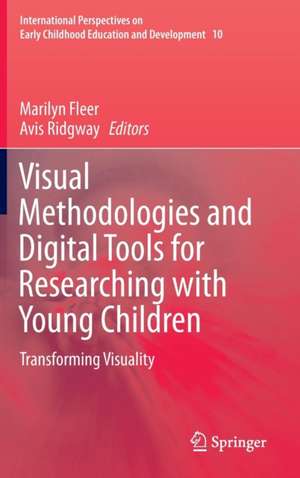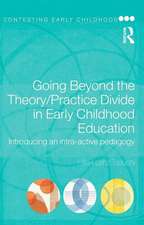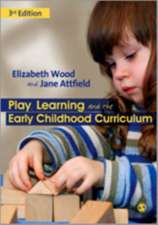Visual Methodologies and Digital Tools for Researching with Young Children: Transforming Visuality: International Perspectives on Early Childhood Education and Development, cartea 10
Editat de Marilyn Fleer, Avis Ridgwayen Limba Engleză Hardback – 27 noi 2013
In particular this book introduces contemporary methodologies for researching child and community development with a focus on visual methodology so the dynamics of development can be captured over time and analysed historically, culturally, socially, ecologically and psychologically through a range of iterative techniques. Visual technology was not freely available in Vygotsky’s time for example, and therefore potentially represents an extension of his genetic experimental approach to researching child development.
The book presents a range of methodological arguments about research into child and community development through which new conceptions for research centred on young children have been created. The authors of the chapters also discuss why a more holistic, dynamic and ethical view of research is needed for generating new knowledge about child development in a range of cultural contexts.
| Toate formatele și edițiile | Preț | Express |
|---|---|---|
| Paperback (1) | 637.93 lei 43-57 zile | |
| Springer International Publishing – 23 aug 2016 | 637.93 lei 43-57 zile | |
| Hardback (1) | 644.18 lei 43-57 zile | |
| Springer International Publishing – 27 noi 2013 | 644.18 lei 43-57 zile |
Din seria International Perspectives on Early Childhood Education and Development
- 18%
 Preț: 786.98 lei
Preț: 786.98 lei - 18%
 Preț: 1005.11 lei
Preț: 1005.11 lei - 24%
 Preț: 673.37 lei
Preț: 673.37 lei -
 Preț: 281.26 lei
Preț: 281.26 lei - 18%
 Preț: 788.72 lei
Preț: 788.72 lei - 18%
 Preț: 1005.74 lei
Preț: 1005.74 lei - 15%
 Preț: 642.18 lei
Preț: 642.18 lei - 15%
 Preț: 645.79 lei
Preț: 645.79 lei -
 Preț: 390.46 lei
Preț: 390.46 lei - 18%
 Preț: 729.53 lei
Preț: 729.53 lei - 18%
 Preț: 892.90 lei
Preț: 892.90 lei - 24%
 Preț: 843.77 lei
Preț: 843.77 lei - 15%
 Preț: 647.40 lei
Preț: 647.40 lei - 15%
 Preț: 703.06 lei
Preț: 703.06 lei - 24%
 Preț: 596.06 lei
Preț: 596.06 lei - 18%
 Preț: 786.36 lei
Preț: 786.36 lei - 15%
 Preț: 638.76 lei
Preț: 638.76 lei - 18%
 Preț: 895.76 lei
Preț: 895.76 lei - 24%
 Preț: 747.51 lei
Preț: 747.51 lei - 15%
 Preț: 584.76 lei
Preț: 584.76 lei - 18%
 Preț: 944.82 lei
Preț: 944.82 lei -
 Preț: 423.08 lei
Preț: 423.08 lei - 18%
 Preț: 944.36 lei
Preț: 944.36 lei - 18%
 Preț: 890.23 lei
Preț: 890.23 lei -
 Preț: 358.01 lei
Preț: 358.01 lei - 15%
 Preț: 639.25 lei
Preț: 639.25 lei - 24%
 Preț: 738.66 lei
Preț: 738.66 lei - 15%
 Preț: 642.51 lei
Preț: 642.51 lei - 18%
 Preț: 777.03 lei
Preț: 777.03 lei - 24%
 Preț: 744.31 lei
Preț: 744.31 lei
Preț: 644.18 lei
Preț vechi: 757.85 lei
-15% Nou
Puncte Express: 966
Preț estimativ în valută:
123.27€ • 129.02$ • 102.59£
123.27€ • 129.02$ • 102.59£
Carte tipărită la comandă
Livrare economică 31 martie-14 aprilie
Preluare comenzi: 021 569.72.76
Specificații
ISBN-13: 9783319014685
ISBN-10: 3319014684
Pagini: 244
Ilustrații: VI, 238 p. 53 illus., 47 illus. in color.
Dimensiuni: 155 x 235 x 25 mm
Greutate: 0.52 kg
Ediția:2014
Editura: Springer International Publishing
Colecția Springer
Seria International Perspectives on Early Childhood Education and Development
Locul publicării:Cham, Switzerland
ISBN-10: 3319014684
Pagini: 244
Ilustrații: VI, 238 p. 53 illus., 47 illus. in color.
Dimensiuni: 155 x 235 x 25 mm
Greutate: 0.52 kg
Ediția:2014
Editura: Springer International Publishing
Colecția Springer
Seria International Perspectives on Early Childhood Education and Development
Locul publicării:Cham, Switzerland
Public țintă
ResearchCuprins
Section 1: Post-developmental Methodologies for Researching with Young Children.- 1. A Digital Turn: Post-developmental Methodologies for Researching with Young Children; M. Fleer.- Section 2: Cultural-historical Conceptualisations of Digital Visual Tools.- 2. Beyond Developmental Geology- A Cultural-historical Theorization of Digital Visual Technologies for Studying Young Children’s Development; M. Fleer.- 3. A Visual Dialectic Methodology - A Visual Dialectical Methodology: Using a Cultural-historical Analysis to Unearth the Family Strategies in Children’s Bilingual Heritage Language Development; L. Li.- 4. Past-present Dialectic- A New Methodological Tool for Seeing the Historical Dynamic in Cultural-historical Research; A. Ridgway.- 5. Intergenerational Family Dialogues; H. Monk.- 6. A Cultural-historical Framework for ‘Everyday’ Research: Theorising Development through Visual Imagery and Dialogue; S. Pennay.- 7. A Visual and Tactile Path: Affective Positioning of Researcher Using a Cultural-historical Visual Methodology; G. Quinones.- 8. Refocusing the Lens on Development - Towards Genetic Research Methodology; N. Veresov.- Section 3: Ethical and Conceptual Issues when Researching with Children Using Digital Visual Tools.- 9. Beyond Alienation: Unpacking the Methodological Issues in Visual Research with Children; J. Agbenyega.- 10. ‘Baby cam’ and Participatory Research with Infants: Opportunities, Constraints and Dilemmas– J. Sumsion and colleagues.- 11. The Ethics of Researching Young Children’s Play when Using Digital Visual Tools; H. Sorenson.- Section 4: Central Concepts for Researching with Young Children Using Digital Visual Tools.- 12. Method, Methodology, Methodological Thinking; N. Veresov.
Textul de pe ultima copertă
This book makes an original contribution to researching child-community development so that those with specific interests in early childhood education have new theoretical tools to guide their research practices. The book explicitly theorises the use of digital visual tools from a cultural-historical perspective. It also draws upon a range of post-structuralist concepts for moving research and scholarship forward. Examples of visual technologies from research in different cultural communities are foregrounded.
In particular this book introduces contemporary methodologies for researching child and community development with a focus on visual methodology so the dynamics of development can be captured over time and analysed historically, culturally, socially, ecologically and psychologically through a range of iterative techniques. Visual technology was not freely available in Vygotsky’s time for example, and therefore potentially represents an extension of his genetic experimental approach to researching child development.
The book presents a range of methodological arguments about research into child and community development through which new conceptions for research centred on young children have been created. The authors of the chapters also discuss why a more holistic, dynamic and ethical view of research is needed for generating new knowledge about child development in a range of cultural contexts.
In particular this book introduces contemporary methodologies for researching child and community development with a focus on visual methodology so the dynamics of development can be captured over time and analysed historically, culturally, socially, ecologically and psychologically through a range of iterative techniques. Visual technology was not freely available in Vygotsky’s time for example, and therefore potentially represents an extension of his genetic experimental approach to researching child development.
The book presents a range of methodological arguments about research into child and community development through which new conceptions for research centred on young children have been created. The authors of the chapters also discuss why a more holistic, dynamic and ethical view of research is needed for generating new knowledge about child development in a range of cultural contexts.
Caracteristici
Presents new digital visual methodological tools for researching early childhood Shows digital visual research of dynamic, holistic and theorised practices in original case study examples. Focuses on framing social discursive practices using cultural-historical and critical theories Demonstrates how digital visual research methods capture the (often invisible) dynamic relations between child, family and community Discusses visual methodology as an ethical tool for early childhood research in varied cultural settings








